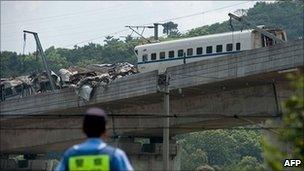China train crash: Design flaws to blame - safety chief
- Published

The panel investigating the crash has come under scrutiny in state media
A crash between two high-speed trains in China that killed 40 people was caused by serious design flaws, the country's safety chief has said.
Luo Lin, who is heading the inquiry into the crash, said the accident near Wenzhou was "completely avoidable".
Mr Luo did not say whether the flaws were in the trains, or the wider rail system. Officials earlier said a signal failure may have been to blame.
The accident has led to an unprecedented public outcry.
The high-speed rail network is a flagship project of China's Communist rulers, who have overseen the construction of the world's largest such infrastructure over the past four years.
But the project hit problems earlier this year with a corruption scandal.
And the Wenzhou crash has led many Chinese to accuse the government of putting politics and profits before safety.
Ambitions dented
Mr Luo, who is director of the State Administration of Work Safety, was quoted in state media as saying there were "serious flaws in the system design that led to an equipment failure".
"At the same time, this exposed problems in emergency response and safety management after the failure occurred," he said.
"This was a major accident involving culpability, that could have been totally avoided."
Mr Luo is heading a panel charged with investigating the crash.
The panel itself has already been the subject of criticism.
Earlier this month, the state-run Global Times published an interview with one of the inquiry panel members who appeared to be unaware of his exact role, or the remit of the inquiry.
On Wednesday, the government reshuffled the panel, removing two officials from the railway ministry - the department that has borne the most criticism from the public.
Beijing hopes to export its high-speed rail expertise across the world, but analysts say the Wenzhou crash has dented those ambitions.
Officials are carrying out a safety review of existing lines, and have put a freeze on the approval of new projects while safety standards are re-evaluated.
On Friday, state-owned train manufacturer CNR announced it was recalling 54 bullet trains that operate on the Beijing-Shanghai line.